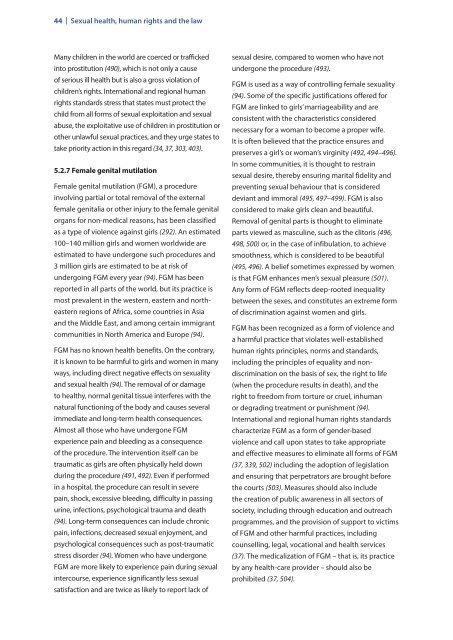Sexual health human rights and the law
1XoaDvM
1XoaDvM
Create successful ePaper yourself
Turn your PDF publications into a flip-book with our unique Google optimized e-Paper software.
44 | <strong>Sexual</strong> <strong>health</strong>, <strong>human</strong> <strong>rights</strong> <strong>and</strong> <strong>the</strong> <strong>law</strong><br />
Many children in <strong>the</strong> world are coerced or trafficked<br />
into prostitution (490), which is not only a cause<br />
of serious ill <strong>health</strong> but is also a gross violation of<br />
children’s <strong>rights</strong>. International <strong>and</strong> regional <strong>human</strong><br />
<strong>rights</strong> st<strong>and</strong>ards stress that states must protect <strong>the</strong><br />
child from all forms of sexual exploitation <strong>and</strong> sexual<br />
abuse, <strong>the</strong> exploitative use of children in prostitution or<br />
o<strong>the</strong>r un<strong>law</strong>ful sexual practices, <strong>and</strong> <strong>the</strong>y urge states to<br />
take priority action in this regard (34, 37, 303, 403).<br />
5.2.7 Female genital mutilation<br />
Female genital mutilation (FGM), a procedure<br />
involving partial or total removal of <strong>the</strong> external<br />
female genitalia or o<strong>the</strong>r injury to <strong>the</strong> female genital<br />
organs for non-medical reasons, has been classified<br />
as a type of violence against girls (292). An estimated<br />
100–140 million girls <strong>and</strong> women worldwide are<br />
estimated to have undergone such procedures <strong>and</strong><br />
3 million girls are estimated to be at risk of<br />
undergoing FGM every year (94). FGM has been<br />
reported in all parts of <strong>the</strong> world, but its practice is<br />
most prevalent in <strong>the</strong> western, eastern <strong>and</strong> nor<strong>the</strong>astern<br />
regions of Africa, some countries in Asia<br />
<strong>and</strong> <strong>the</strong> Middle East, <strong>and</strong> among certain immigrant<br />
communities in North America <strong>and</strong> Europe (94).<br />
FGM has no known <strong>health</strong> benefits. On <strong>the</strong> contrary,<br />
it is known to be harmful to girls <strong>and</strong> women in many<br />
ways, including direct negative effects on sexuality<br />
<strong>and</strong> sexual <strong>health</strong> (94). The removal of or damage<br />
to <strong>health</strong>y, normal genital tissue interferes with <strong>the</strong><br />
natural functioning of <strong>the</strong> body <strong>and</strong> causes several<br />
immediate <strong>and</strong> long-term <strong>health</strong> consequences.<br />
Almost all those who have undergone FGM<br />
experience pain <strong>and</strong> bleeding as a consequence<br />
of <strong>the</strong> procedure. The intervention itself can be<br />
traumatic as girls are often physically held down<br />
during <strong>the</strong> procedure (491, 492). Even if performed<br />
in a hospital, <strong>the</strong> procedure can result in severe<br />
pain, shock, excessive bleeding, difficulty in passing<br />
urine, infections, psychological trauma <strong>and</strong> death<br />
(94). Long-term consequences can include chronic<br />
pain, infections, decreased sexual enjoyment, <strong>and</strong><br />
psychological consequences such as post-traumatic<br />
stress disorder (94). Women who have undergone<br />
FGM are more likely to experience pain during sexual<br />
intercourse, experience significantly less sexual<br />
satisfaction <strong>and</strong> are twice as likely to report lack of<br />
sexual desire, compared to women who have not<br />
undergone <strong>the</strong> procedure (493).<br />
FGM is used as a way of controlling female sexuality<br />
(94). Some of <strong>the</strong> specific justifications offered for<br />
FGM are linked to girls’ marriageability <strong>and</strong> are<br />
consistent with <strong>the</strong> characteristics considered<br />
necessary for a woman to become a proper wife.<br />
It is often believed that <strong>the</strong> practice ensures <strong>and</strong><br />
preserves a girl’s or woman’s virginity (492, 494–496).<br />
In some communities, it is thought to restrain<br />
sexual desire, <strong>the</strong>reby ensuring marital fidelity <strong>and</strong><br />
preventing sexual behaviour that is considered<br />
deviant <strong>and</strong> immoral (495, 497–499). FGM is also<br />
considered to make girls clean <strong>and</strong> beautiful.<br />
Removal of genital parts is thought to eliminate<br />
parts viewed as masculine, such as <strong>the</strong> clitoris (496,<br />
498, 500) or, in <strong>the</strong> case of infibulation, to achieve<br />
smoothness, which is considered to be beautiful<br />
(495, 496). A belief sometimes expressed by women<br />
is that FGM enhances men’s sexual pleasure (501).<br />
Any form of FGM reflects deep-rooted inequality<br />
between <strong>the</strong> sexes, <strong>and</strong> constitutes an extreme form<br />
of discrimination against women <strong>and</strong> girls.<br />
FGM has been recognized as a form of violence <strong>and</strong><br />
a harmful practice that violates well-established<br />
<strong>human</strong> <strong>rights</strong> principles, norms <strong>and</strong> st<strong>and</strong>ards,<br />
including <strong>the</strong> principles of equality <strong>and</strong> nondiscrimination<br />
on <strong>the</strong> basis of sex, <strong>the</strong> right to life<br />
(when <strong>the</strong> procedure results in death), <strong>and</strong> <strong>the</strong><br />
right to freedom from torture or cruel, in<strong>human</strong><br />
or degrading treatment or punishment (94).<br />
International <strong>and</strong> regional <strong>human</strong> <strong>rights</strong> st<strong>and</strong>ards<br />
characterize FGM as a form of gender-based<br />
violence <strong>and</strong> call upon states to take appropriate<br />
<strong>and</strong> effective measures to eliminate all forms of FGM<br />
(37, 339, 502) including <strong>the</strong> adoption of legislation<br />
<strong>and</strong> ensuring that perpetrators are brought before<br />
<strong>the</strong> courts (503). Measures should also include<br />
<strong>the</strong> creation of public awareness in all sectors of<br />
society, including through education <strong>and</strong> outreach<br />
programmes, <strong>and</strong> <strong>the</strong> provision of support to victims<br />
of FGM <strong>and</strong> o<strong>the</strong>r harmful practices, including<br />
counselling, legal, vocational <strong>and</strong> <strong>health</strong> services<br />
(37). The medicalization of FGM – that is, its practice<br />
by any <strong>health</strong>-care provider – should also be<br />
prohibited (37, 504).


